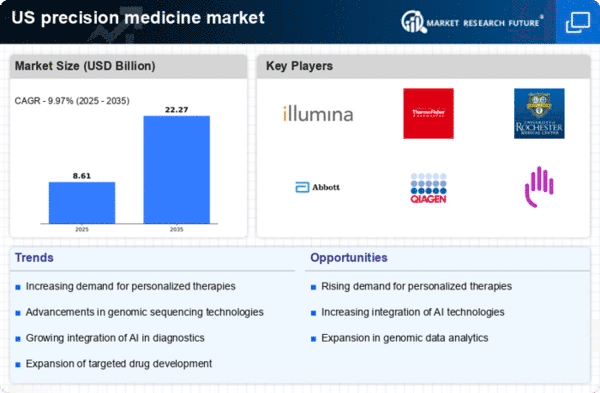Supportive Reimbursement Policies
Supportive reimbursement policies are emerging as a vital driver for the precision medicine market. As insurers recognize the value of personalized medicine, they are increasingly willing to cover the costs associated with genetic testing and targeted therapies. This shift in reimbursement practices is likely to enhance patient access to precision treatments, thereby expanding the market. In 2025, it is anticipated that reimbursement for precision medicine services will increase by approximately 20%, further solidifying the precision medicine market. Such policies not only encourage healthcare providers to adopt innovative therapies but also foster a more favorable environment for market growth.
Increased Investment in Biotechnology
Investment in biotechnology is a significant driver of the precision medicine market. Venture capital funding and public investments are increasingly directed towards biotech firms that focus on developing precision therapies. In 2025, the biotechnology sector is expected to attract over $50 billion in investments, with a substantial portion allocated to precision medicine initiatives. This influx of capital is likely to accelerate the development of novel therapies and diagnostic tools, thereby enhancing the precision medicine market. As a result, the market is poised for rapid growth, with new entrants and established companies alike striving to capitalize on this trend.
Growing Prevalence of Chronic Diseases
The rising prevalence of chronic diseases such as cancer, diabetes, and cardiovascular disorders is a critical driver of the precision medicine market. As these conditions become more common, there is an increasing need for targeted therapies that can address the specific genetic and molecular characteristics of individual patients. In the US, chronic diseases account for approximately 70% of all deaths, underscoring the urgent need for innovative treatment solutions. This trend is likely to propel the precision medicine market forward, as healthcare providers seek to implement more effective and personalized treatment strategies to combat these diseases.
Advancements in Diagnostic Technologies
Advancements in diagnostic technologies are significantly influencing the precision medicine market. Innovations such as next-generation sequencing and liquid biopsy are enabling more accurate and timely diagnoses, which are essential for the effective implementation of precision therapies. The market for diagnostic tools is expected to grow at a CAGR of around 15% through 2026, reflecting the increasing reliance on advanced diagnostics in the precision medicine market. These technologies not only enhance patient outcomes but also facilitate the identification of suitable candidates for targeted therapies, thereby driving market growth.
Rising Demand for Personalized Treatments
The precision medicine market is experiencing a notable increase in demand for personalized treatments, driven by a growing awareness among patients and healthcare providers. Patients are increasingly seeking therapies tailored to their unique genetic profiles, which enhances treatment efficacy and minimizes adverse effects. This shift towards personalized care is reflected in market data, indicating that the market is projected to reach approximately $100 billion by 2026, growing at a CAGR of around 11%. As healthcare systems adapt to this demand, the precision medicine market is likely to see further investments in research and development, ultimately leading to more innovative treatment options.
















